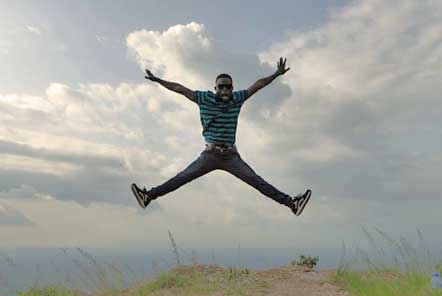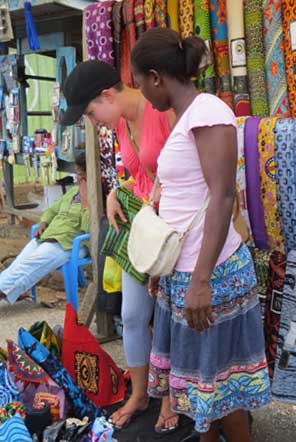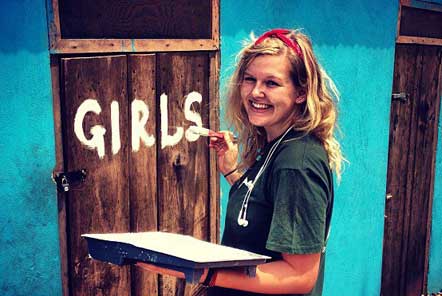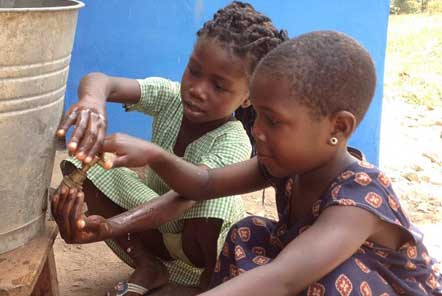Bee’s Top 11 Tips to know before your trip to Ghana!
Volunteer Experiences / 17 July 2018
Stepping off the plane on arrival at Kotoka International Airport in Accra, into Ghana’s warm, tropical air and a bustling airport is an exciting experience!
Ghana is known as the ‘Gateway to Africa’ for first time travellers to the vast continent with good reason! I'm Bee the Pod Volunteer Specialist at Pod Volunteer for our projects in Ghana and I’ve put together a list of the little things we think you need to know before you join your placement at our projects!
1. Handy hand luggage!
Before getting on the plane, it’s worth making sure you have a pen handy in your carry-on luggage, ready for your landing form when you arrive in Accra. You’ll also need your yellow fever vaccination certificate with you to present on landing. Don't forget to have your malaria tablets with you too, as you may need to start taking them a few days before you arrive and wouldn’t want to miss a day if they’re secured in the hold of the plane!
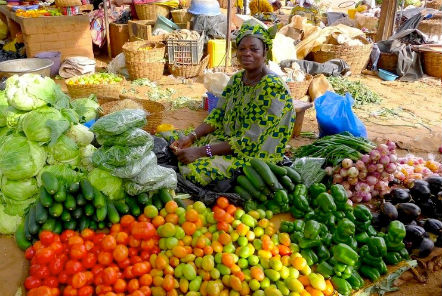
2. Stepping into Ghana
Arriving into a busy airport somewhere completely new is quite an experience. As with travel across the globe, when you arrive into Accra there may be lots of taxi drivers who offer you assistance or to borrow their phone. Being prepared for this definitely helps. Stay put, you know where you’re being met and who you’re meeting!
If you are carrying cash, remember to store it in different places in your luggage. Small notes are good to have on hand so you’re not getting out a great wad of cash to pay for that bottle of water you might feel in need of!
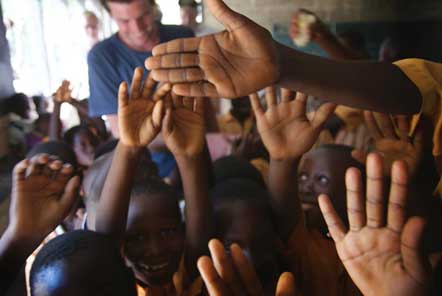
3. Akwaaba Obruni!
Greetings are very important in Ghanaian culture and there are a few phrases you might hear a lot of during your stay in Ghana. ‘Akwaaba!’ (or ‘welcome!’) will be one of them!
Getting to know the Ghanaian community is one of the best parts of visiting Ghana. They are warm, friendly and welcoming – so be proactive, learn a little Twi and get talking to people! With the help of Master Gyampoh (the head teacher at the school volunteers work in) we’ve put together a list of helpful phrases to get you started here.
4. Sorry for the left!
It’s a cultural taboo to use your left hand when greeting others or eating with your hands in Ghana (try it – banku and fufu are both eaten with your hands and are scrummy!). This is because it’s traditionally the hand that’s used for the toilet – so you should try your best not to use your left hand too! Particularly when shaking hands, waving, eating or handing something to another person. If you find yourself making a mistake (very easily done!) or with your right hand full, it’s polite to say “sorry for the left!” – a great turn of phrase!
5. Do I look good in this?
Ghanaians have a great sense of style! Lightweight clothing is a must for the hot temperatures, but it’s also worth remembering that Teaching and Early Learning volunteers will need to dress modestly when working with children – the local teachers all dress very smartly so it’s great to fit in with them! You can also have clothes made during your stay. If you spot a fabric you like at the market, have a barter and then take your new fabric to the local tailor and you could return home with a whole new vibrant, well-fitting Ghanaian wardrobe!
6. The drop of no return
Don’t forget to take your torch or head torch for night time trips to the long drop! Although it might be tempting to use the light on your phone, we’d advise against it – dropping a head torch down the long drop might mean a novel experience until the batteries run out, but it’s certainly better than dropping your phone! And believe us, cameras, phones, phrasebooks – we’ve seen it all - so best to leave those in your room!
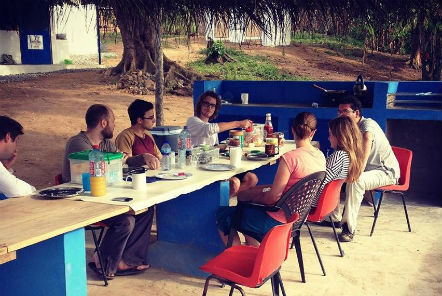
7. Be prepared for early mornings!
Ghana is just north of the equator, so sunrise and sunset only differ by a maximum of 40 minutes throughout the year. It’s common for Ghanaians to regularly rise at 5am, or even earlier (Aikins told me he sometimes even gets up at 4am!). But don’t worry, volunteers don’t start quite this early!
On weekdays, volunteers take it turns to prepare breakfast for each other, getting up at 6:30am to have breakfast on the table for 7am. It may take a little while to settle into this routine for anyone that’s normally a late starter, but relaxed evenings and weekends to yourself make this adjustment to your body clock easily adaptable!
8. Water, water and more water!
It’s hot in Ghana, very hot! With temperatures that can reach up to 38˚C and high humidity, it’s important to make sure you drink plenty of water. The local team recommends drinking around 3 litres a day. We’d also highly recommend taking plenty of rehydration salts with you – particularly for Building volunteers. Whilst you’re acclimatising during your first few days you’ll be drinking bottled water. You then have the choice to either continue on bottled water or to move to purified ‘bagged water’. The team in Ghana are working in partnership with Trashy Bags to ensure your water sachets are all recycled! You can find out more about this partnership here.
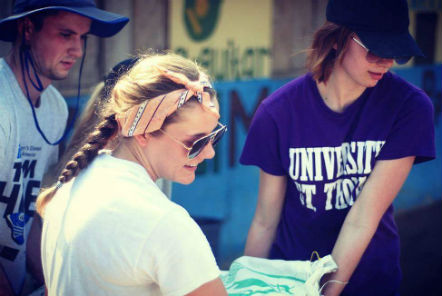
9. What about donations?
Volunteers aren’t expected to, but many often ask us if they can bring resources or donations to give to the project. Over the years, volunteers have been incredibly generous and donated all number of things – teaching resources, sports equipment, clothing, stationary, games, the list goes on!
If you have space in your packing and feel like bringing something along then these are all really valued and appreciated. The charity know the communities they work with really well and carefully manage donations to make sure they get where they are most needed. So although it might be hard, it’s best not to give on an individual basis as we want the communities to get the most out of any donations too!
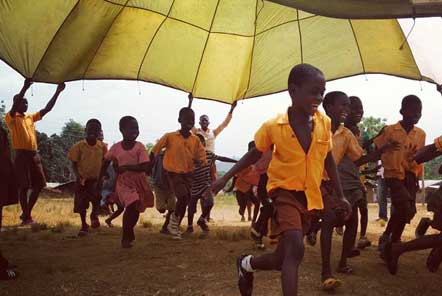
10. Travel Insurance
A slightly less exciting (but important!) tip – don’t forget to make sure you have travel insurance and take a print out of the details with you. Travel Insurance is essential and you need adequate cover for your placement.
11. Be proactive
This one applies to all volunteering projects – volunteering your time at a project overseas, supporting local initiatives and long term development goals is an amazing thing to do! To make sure you make the most out of your placement, we like to encourage all our volunteers to be proactive.
You might not ever get this opportunity again, so whilst you’re at the project, if you see something that you’d like to help with or get involved in – ask someone! The local team in Ghana are amazing at getting volunteers involved in all areas of the project, but they won’t know you’re interested in doing more if you don’t tell them.
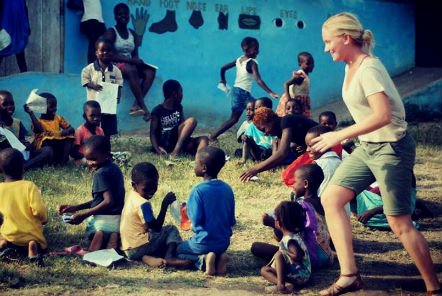
Finally and most importantly, smile! Get involved in trying local food or dancing at a local event. Be respectful and polite and you’ll make a great impression!
I hope you have an amazing trip and look forward to hearing all about your time in the village! If you think of your own tips whilst you’re there too, let me know!
Find out more about our projects in Ghana here: https://www.podvolunteer.org/destination/ghana



